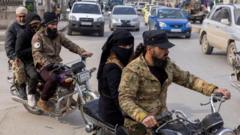The control of Hayat Tahrir al-Sham in Idlib signals a complex transformation in governance following the fall of Assad. While residents experience newfound freedoms and improvements, concerns about authoritarianism and the group's extremist past linger in this war-torn region.
Idlib's New Dawn: A Glimpse into Life Under Rebel Governance

Idlib's New Dawn: A Glimpse into Life Under Rebel Governance
With Bashar al-Assad ousted, Idlib showcases Hayat Tahrir al-Sham's impact on governance and community dynamics amid ongoing uncertainty.
Idlib, once a battleground marked by the scars of civil war, has recently become a focal point of governance under the Islamist group Hayat Tahrir al-Sham (HTS), which gained control in 2017. Following the remarkable ousting of Bashar al-Assad and his regime, HTS has assumed a role as the de facto authority, striving to extend its influence across Syria while managing daily life for around 4.5 million residents.
The remnants of previous conflicts are omnipresent — abandoned military positions and remnants of artillery punctuate the landscape. However, signs of recovery, including renovated homes, bustling shops, and improved public services, paint a picture of a community attempting to rebuild. Observers note that the streets are maintained, and utilities function reasonably well, contrasting sharply with many other regions still plagued by chaos.
Dr. Hamza Almoraweh, a cardiologist who settled in Idlib after fleeing Aleppo in 2015, observes that the region has seen considerable development since HTS took charge, describing Idlib as no longer the "forgotten city" under Assad. While HTS has made efforts to soften its image and seek international recognition, the U.S. and other nations still classify it as a terrorist organization, presenting a paradox of stability amid longstanding fears.
As HTS moderated public policies, it lifted some stringent social restrictions, allowing a certain level of critique, unlike the previous regime’s oppression. Fuad Sayedissa, an activist from Idlib, suggests that while freedom has improved, the fight against authoritarianism remains crucial, urging vigilance against any future potential dictatorship.
However, the remnants of Assad's authoritative reign still cast a shadow over this group's legitimacy. Though there have been welcomed changes for minority communities, fears are pervasive regarding HTS’s commitment to protect these groups as power dynamics shift in the broader Syrian landscape. Friar Fadi Azar, a local clergyman, expresses cautious optimism, noting newfound freedoms for his Christian community, but also questioning whether HTS can be genuinely trusted to uphold these freedoms.
As HTS shapes its governance model in Idlib, the residents experience a dichotomy of newfound liberties and cautionary vigilance. With a history marred by suffering and oppression, many are eager to embrace change but remain prepared to confront any emerging authoritarian tendencies. "We will not allow dictators again," warns Sayedissa, capturing the spirit of a populace yearning for stability without the old regime's iron grip.




















